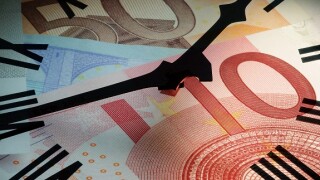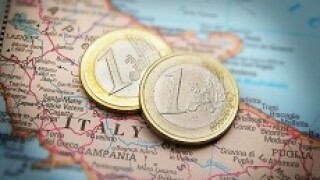BBVA
-
The European Investment Bank achieved its biggest ever order book in euros on Tuesday, as it sold its first seven year benchmark of the year.
-
The region of Madrid and the European Investment Bank are both marketing seven year euro deals, with the former preparing the first green labelled bond by a Spanish government entity. Elsewhere in the euro public sector bond market, Ontario Teachers’ Finance Trust is moving forward with its first bond in the currency.
-
Italy mandated banks for a new five year to be sold alongside a tap of a September 2050 bond on Monday as it prepares to bolt on a bigger funding programme in order to fund its effort against the coronavirus pandemic. The sovereign will be joined by Luxembourg in the euro public sector bond market on Tuesday.
-
The corporate bond market made a blazing start to Monday with deals for Repsol, Naturgy and LafargeHolcim on screens, as issuers cram what they can into a shortened week.
-
-
High grade companies poured into the bond market this week as participants weigh up whether this is a redux of 2009’s record year or if the unprecedented central bank spending and high bank liquidity mean that this is a unique market where borrowers raise cash even if they do not really need it.
-
Spain’s Red Eléctrica Corporación has hired banks to run a series of fixed income investor calls for a debut five year senior unsecured deal, in the first European corporate roadshow since stringent social distancing measures were implemented across the continent.
-
Portugal will be hoping to mirror the success of Belgium after the latter smashed records in the public sector bond market on Tuesday with the biggest ever order book for an SSA borrower in euros. Both Portugal and Belgium have announced an anticipated increase to their 2020 funding programmes as result of the Covid-19 crisis.
-
Bank of America reopened the market for financial institution bonds in euros this week and was followed by a slew of other deals as investors welcomed wider spreads and new issue concessions.
-
-
Confectionery company Néstle, soft drink maker Coca-Cola European Partners and French pharmaceutical company Sanofi piled into Europe's bond market with new issues on Tuesday, suggesting that borrowers are increasingly eager and quick to react when the market shows any signs of stabilising.
-
On Monday, a day when European stock indices plummeted, hedge fund giant Bridgewater Associates was executing short positions against 37 of the continent's companies, particularly in France, Germany, Spain and the Netherlands.










